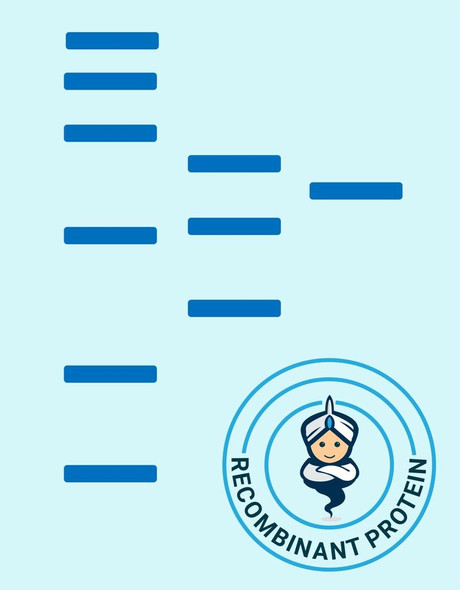Enzymes Recombinant Proteins
Human UBE2L3 Recombinant Protein (RPPB2383)
- SKU:
- RPPB2383
- Product Type:
- Recombinant Protein
- Species:
- Human
- Uniprot:
- P68036
- Research Area:
- Enzymes
Description
| Product Name: | Human UBE2L3 Recombinant Protein |
| Product Code: | RPPB2383 |
| Size: | 50µg |
| Species: | Human |
| Target: | UBE2L3 |
| Synonyms: | Ubiquitin-conjugating enzyme E2 L3, EC 6.3.2.19, Ubiquitin-protein ligase L3,Ubiquitin carrier protein L3, UbcH7, E2-F1, L-UBC, UbcM4. |
| Source: | Escherichia Coli |
| Physical Appearance: | Sterile filtered colorless solution. |
| Formulation: | The protein contains 50mM HEPES (pH-7.5) 150mM NaCl, 1mM DTT, and 10% glycerol. |
| Stability: | Store at 4°C if entire vial will be used within 2-4 weeks. Store, frozen at -20°C for longer periods of time. For long term storage it is recommended to add a carrier protein (0.1% HSA or BSA).Avoid multiple freeze-thaw cycles. |
| Purity: | Greater than 95.0% as determined by(a) Analysis by RP-HPLC.(b) Analysis by SDS-PAGE. |
| Amino Acid Sequence: | MAASRRLMKE LEEIRKCGMK NFRNIQVDEA NLLTWQGLIV PDNPPYDKGA FRIEINFPAE YPFKPPKITF KTKIYHPNID EKGQVCLPVI SAENWKPATK TDQVIQSLIA LVNDPQPEHP LRADLAEEYS KDRKKFCKNA EEFTKKYGEK RPVD |
Human Ubquitin-conjugating enzyme 7 (UbcH7) is a ubiquitin-conjugating enzyme (E2) mediating c-fos degradation, transcription factor NF-B maturation, and human papilloma virus-mediated p53 and Myc protein degradation, in vitro. The ubiquitin-conjugating enzymes (E2s) are essential components of the post-translational protein ubiquitination pathway, mediating the transfer of activated ubiquitin to substrate proteins. The human UBE2L1-UBE2L4 gene could potentially encode different isoforms of the UbcH7. UBE2L3 gene, located at chromosome 22q11.2, is the only identical family member with introns and encodes a polypeptide sequence identical to that of UbcH7.
Ubiquitin-Conjugating Enzyme E2L 3 Human Recombinant produced in E.Coli is a single, non-glycosylated polypeptide chain containing 154 amino acids & having a molecular mass of 17.9 kDa.
| UniProt Protein Function: | UBE2L3: Ubiquitin-conjugating enzyme E2 that specifically acts with HECT-type and RBR family E3 ubiquitin-protein ligases. Does not function with most RING-containing E3 ubiquitin-protein ligases because it lacks intrinsic E3-independent reactivity with lysine: in contrast, it has activity with the RBR family E3 enzymes, such as PARK2 and ARIH1, that function like function like RING-HECT hybrids. Accepts ubiquitin from the E1 complex and catalyzes its covalent attachment to other proteins. In vitro catalyzes 'Lys-11'-linked polyubiquitination. Involved in the selective degradation of short-lived and abnormal proteins. Down- regulated during the S-phase it is involved in progression through the cell cycle. Regulates nuclear hormone receptors transcriptional activity. May play a role in myelopoiesis. Interacts with PARK2; involved in ubiquitination and degradation of misfolded proteins. Interacts with UBE3A; used by the papilloma virus HPV-16 E6 protein to ubiquitinate p53/TP53. Interacts with CCNB1IP1, CBL, ZAP70, RNF19A, RNF19B and RNF144B. Interacts with ARIH1. Interacts with ARIH2 (via RING-type 1). Interacts with NCOA1; they functionally interact to regulate progesterone receptor transcriptional activity. May interact with NR3C1. Ubiquitous, with highest expression in testis. Belongs to the ubiquitin-conjugating enzyme family. |
| UniProt Protein Details: | Protein type:Nuclear receptor co-regulator; Ubiquitin conjugating system; EC 6.3.2.19; Ubiquitin ligase; Ligase Chromosomal Location of Human Ortholog: 22q11.21 Cellular Component: cytoplasm; nucleus; ubiquitin ligase complex Molecular Function:protein binding; enzyme binding; ubiquitin protein ligase binding; transcription coactivator activity; ubiquitin-protein ligase activity; ATP binding; ligase activity Biological Process: ubiquitin-dependent protein catabolic process; cell proliferation; protein polyubiquitination; regulation of transcription, DNA-dependent; transcription, DNA-dependent; positive regulation of protein ubiquitination; positive regulation of ubiquitin-protein ligase activity; protein modification process; protein ubiquitination |
| NCBI Summary: | The modification of proteins with ubiquitin is an important cellular mechanism for targeting abnormal or short-lived proteins for degradation. Ubiquitination involves at least three classes of enzymes: ubiquitin-activating enzymes (E1s), ubiquitin-conjugating enzymes (E2s) and ubiquitin-protein ligases (E3s). This gene encodes a member of the E2 ubiquitin-conjugating enzyme family. This enzyme is demonstrated to participate in the ubiquitination of p53, c-Fos, and the NF-kB precursor p105 in vitro. Several alternatively spliced transcript variants have been found for this gene. [provided by RefSeq, Sep 2009] |
| UniProt Code: | P68036 |
| NCBI GenInfo Identifier: | 54039805 |
| NCBI Gene ID: | 7332 |
| NCBI Accession: | P68036.1 |
| UniProt Related Accession: | P68036 |
| Molecular Weight: | |
| NCBI Full Name: | Ubiquitin-conjugating enzyme E2 L3 |
| NCBI Synonym Full Names: | ubiquitin conjugating enzyme E2 L3 |
| NCBI Official Symbol: | UBE2L3�� |
| NCBI Official Synonym Symbols: | E2-F1; L-UBC; UBCH7; UbcM4�� |
| NCBI Protein Information: | ubiquitin-conjugating enzyme E2 L3 |
| UniProt Protein Name: | Ubiquitin-conjugating enzyme E2 L3 |
| UniProt Synonym Protein Names: | L-UBC; UbcH7; Ubiquitin carrier protein L3; Ubiquitin-conjugating enzyme E2-F1; Ubiquitin-protein ligase L3 |
| UniProt Gene Name: | UBE2L3�� |
| UniProt Entry Name: | UB2L3_HUMAN |






